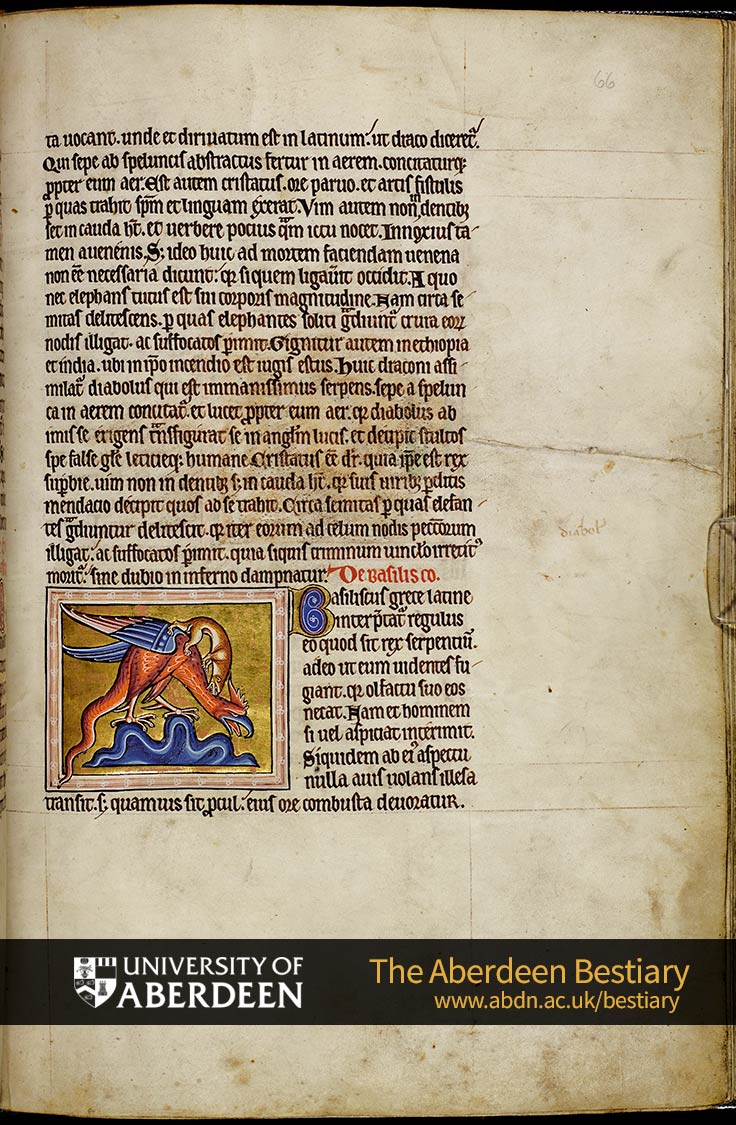- Commentary
-
Commentary
Text
The dragon kills by wrapping its tail around a victim and it can even kill elephants. The basilisk is the king of crawling things and can kill with a glance.
Illustration
This basilisk has a raptor's beak, a cockscomb, wings, a tail and claws. He is being attacked by a weasel.
Comment
Early accounts of the basilisk (Dioscorides, in the first century) describe it as an ordinary snake with a head excrescence, probably a king cobra. Killing at a glance may refer to the spitting cobra who has no need to bite. The mongoose, rather like a weasel, can kill cobras. Correction In margin, 'diabol' supplies omission. The word 'devil' is omitted from several 2nd-family manuscripts, but it is found in Isidore, the source (Clark, 1992, 195, n.341, 342). Prick marks on the page relate to the serpent on f.66v. Initial type 2.
Folio Attributes
- Transcription and Translation
-
Transcription
ta vocant, unde et dirivatum est in Latinum; ut draco diceretur.\ Qui sepe ab speluncis abstractus fertur in aerem, concitaturque\ propter eum aer. Est autem cristatus, ore parvo, et artis fistulis\ per quas trahit spiritum et linguam exerat. Vim autem non in dentibus\ set in cauda habet, et verbere pocius quam ictu nocet. Innoxius ta\men a venenis. Sed ideo huic ad mortem faciendam venena\ non esse necessaria dicunt, quia siquem ligaverit occidit. A quo\ nec elephans tutus est sui corporis magnitudine. Nam circa se\mitas delitescens, per quas elephantes soliti gradiuntur crura eorum\ nodis illigat, ac suffocatos perimit. Gignitur autem in Ethiopia\ et India, ubi in ipso incendio est iugis estus. Huic draconi assi\milatur diabolus qui est immanissimus serpens, sepe a spelun\ca in aerem concitatur, et lucet propter eum aer, quia diabolus ab\ imis se erigens transfigurat se in angelum lucis, et decipit stultos\ spe false glorie leticieque humane. Cristatus esse dicitur, quia ipse est rex\ superbie, vim non in dentibus sed in cauda habet, quia suis viribus perditis\ mendacio decipit quos ad se trahit. Circa semitas per quas elefan\tes gradiuntur delitescit, quia iter eorum ad celum nodis peccatorum\ illigat, ac suffocatos perimit, quia siquis criminum vinculo irretitus\ moritur, sine dubio in inferno dampnatur.\ De basilisco \Basiliscus Grece Latine\ interpretatur regulus\ eo quod sit rex serpentium\ adeo ut eum videntes fu\giant, quia olfactu suo eos\ necat. Nam et hominem\ si vel aspiciat interimit.\ Siquidem ab eius aspectu\ nulla avis volans illesa\ transit, sed quamvis sit procul, eius ore combusta devoratur.\Translation
call it dracon, from this is derived its Latin name draco. The dragon, it is said, is often drawn forth from caves into the open air, causing the air to become turbulent. The dragon has a crest, a small mouth, and narrow blow-holes through which it breathes and puts forth its tongue. Its strength lies not in its teeth but in its tail, and it kills with a blow rather than a bite. It is free from poison. They say that it does not need poison to kill things, because it kills anything around which it wraps its tail. From the dragon not even the elephant, with its huge size, is safe. For lurking on paths along which elephants are accustomed to pass, the dragon knots its tail around their legs and kills them by suffocation. Dragons are born in Ethiopia and India, where it is hot all year round. The Devil is like the dragon; he is the most monstrous serpent of all; he is often aroused from his cave and causes the air to shine because, emerging from the depths, he transforms himself into the angel of light and deceives the foolish with hopes of vainglory and worldly pleasure. The dragon is said to be crested, as the Devil wears the crown of the king of pride. The dragon's strength lies not in its teeth but its tail, as the Devil, deprived of his strength, deceives with lies those whom he draws to him. The dragon lurks around paths along which elephants pass, as the Devil entangles with the knots of sin the way of those bound for heaven and, like the dragon, kills them by suffocation; because anyone who dies fettered in the chains of his offences is condemned without doubt to hell. Of the basilisk The basilisk's name in Greek, translated into Latin, regulus, means 'little king'. It is so called because it is the king of crawling things, who flee when they see it, because it kills them with its scent. It will even kill a man just by looking at him. Indeed, no bird can fly past unharmed by its gaze but, however far away, will be burnt up and devoured in its mouth.

